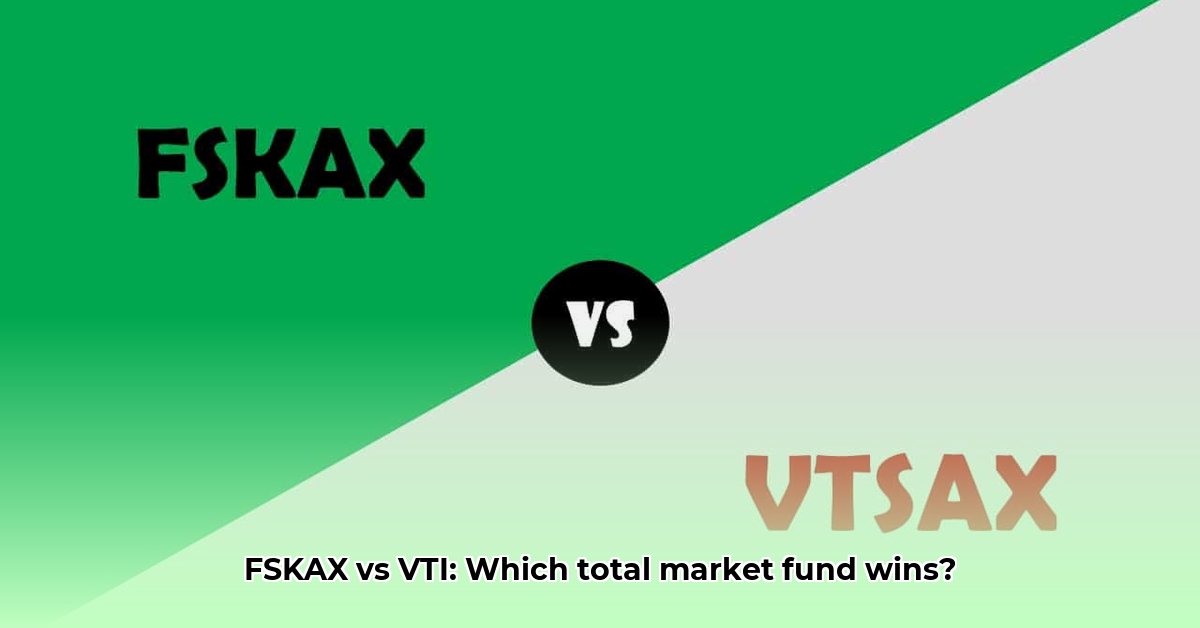
Choosing between Fidelity's FSKAX and Vanguard's VTI, two leading index funds aiming to track the entire US stock market, requires careful consideration of their subtle but significant differences. This review will guide you through the key distinctions, helping you determine which fund best aligns with your investment strategy. We'll unpack the nuances of mutual funds versus ETFs, explore the implications for taxation, and provide actionable steps for different investor profiles.
Understanding the Key Differences: Mutual Fund vs. ETF
At their core, FSKAX and VTI share a common goal: tracking the US total stock market. However, their structures differ significantly. FSKAX is a mutual fund, while VTI is an exchange-traded fund (ETF). This seemingly minor detail has substantial repercussions for trading, tax implications, and overall investment strategy.
ETFs, like VTI, trade throughout the day on exchanges, offering intraday liquidity. This flexibility is particularly beneficial for active traders or those needing to react quickly to market shifts. Mutual funds, such as FSKAX, only trade at the end of the day, limiting daily trading opportunities. This difference alone can sway the decision for active investors.
Tax implications also vary considerably. Mutual funds often distribute capital gains to investors, resulting in taxable events. ETFs, on the other hand, typically avoid these distributions, leading to greater tax efficiency, especially significant in taxable accounts.
A Comparative Analysis: FSKAX vs VTI
The table below summarizes the key differences between FSKAX and VTI, enabling a clear comparison:
| Feature | FSKAX (Fidelity) | VTI (Vanguard) |
|---|---|---|
| Fund Type | Mutual Fund | ETF |
| Expense Ratio | 0.015% | 0.03% |
| Trading | End-of-day | Intraday |
| Dividend Yield | Generally Lower | Generally Higher |
| Minimum Investment | $0 (fractional shares allowed) | Varies depending on brokerage (fractional shares often allowed) |
| Tax Efficiency | Lower (due to potential capital gains distributions) | Higher (typically fewer distributions) |
Is a slightly lower expense ratio worth the trade-offs in liquidity and tax efficiency for the average investor? Let's consider that further.
Key Insight 1: The expense ratio difference between FSKAX and VTI is minimal, but the tax implications of capital gains distributions from FSKAX can be more substantial over time, especially in taxable accounts.
Choosing the Right Fund: A Guide for Different Investor Profiles
The ideal choice depends heavily on individual circumstances and investing goals. Let's analyze how different investor profiles might approach this dilemma.
1. The Long-Term, Buy-and-Hold Investor: For investors with a long-term horizon, prioritizing consistent, regular contributions, both funds are suitable. The minor differences in expense ratios and tax efficiency are less impactful over extended periods. However, the convenience of fractional shares for smaller contributions might incline some to FSKAX.
2. The Tax-Conscious Investor: In taxable accounts, VTI's superior tax efficiency significantly outweighs the slightly higher expense ratio. This feature greatly benefits those seeking to maximize their after-tax returns.
3. The Active Trader: VTI's intraday trading offers the flexibility active traders require to react swiftly to market changes. This added liquidity justifies the slightly higher expense ratio for those who actively manage their portfolios.
4. The Risk-Averse Investor: While not a significant differentiator, historical data might show slightly smaller maximum drawdowns for FSKAX in some periods. However, this is not a reliable predictor of future performance. The long-term performance of both funds is remarkably similar.
Key Insight 2: While both funds offer great exposure to the broad US market, the optimal choice depends heavily on your investment timeline, trading frequency, and tax situation.
Key Insight 3: Diversification beyond either FSKAX or VTI is crucial for a well-rounded investment portfolio. Consider incorporating other asset classes, such as bonds and international equities, to achieve optimal diversification.
Actionable Steps: Choosing Your Fund
- Assess Your Investment Goals: Define your investment horizon (short-term, long-term), and your risk tolerance.
- Account Type Matters: If investing in a taxable account, VTI's tax efficiency is a significant advantage. Tax-advantaged accounts such as 401(k)s and IRAs minimize the impact of tax implications.
- Trading Frequency: Active traders benefit from VTI's intraday liquidity. Passive investors are better served by either option.
- Consider Minimum Investment Amounts and Fractional Shares: Many brokers allow fractional shares for both, but confirm before investing.
- Consult a Financial Advisor: This analysis is for informational purposes only and should not replace professional investment advice. A financial advisor can provide personalized guidance tailored to your specific needs.
Disclaimer: This information is for educational purposes only and does not constitute financial advice. Investment decisions should be made based on your individual financial situation and risk tolerance. Consult a qualified financial advisor before making any investment decisions.